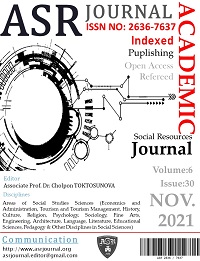İTTİFAK SİSTEMİ ETKİSİNİN ANALİZİ AMACIYLA ADANA VE MERSİN İLLERİNDE 2015 VE 2018 GENEL SEÇİM SONUÇLARININ KARŞILAŞTIRILMASI
Author :
Abstract
Adana ve Mersin illeri Çukurova bölgesinde büyük nüfusları dolayısıyla geniş seçmen kitlesi barındırmakta olup seçimlerde çıkardıkları milletvekili sayısı açısından da siyasi partilerin oldukça önem verdiği ve özel ilgi gösterdiği iller arasında bulunmaktadır. Türkiye’de 16 Nisan 2017 referandumuyla kabul edilen Cumhurbaşkanlığı hükümet sistemi sonrasında partilerin İttifaklar halinde genel seçimlere katılabilmesine imkân tanınmıştır. Bu doğrultuda 24 Haziran 2018 tarihinde Cumhurbaşkanlığı seçimleri, genel seçimlerle beraber gerçekleştirilmiştir. Bu çalışmada ittifak sisteminin seçim sonuçları üzerinde nasıl tesir ettiğinin anlaşılmasına katkı amacıyla mikro düzeyde Mersin ve Adana illeri özelinde 1 Kasım 2015 yılı genel seçimleri ve 24 Haziran 2018 genel seçim sonuçları mukayeseli olarak analiz edilecektir. 2018 seçim sonuçlarına bakıldığında gerek Adana’da gerek Mersin’de Cumhur İttifakı partilerinin toplamda aldıkları oyun 1 Kasım 2015 seçimine göre önemli düşüş gösterdiği görülmektedir. Bu açıdan ittifak sisteminin her iki partiye çok da yaramadığı söylenebilir. Ayrıca ittifak yapılanmasının her iki ilde de parti özelinde CHP’nin pek lehine sonuçlar vermediği ve ana muhalefet partisinin iktidar partisinin kayıp yaşadığı seçimde beklenen çıkışı yapamadığı, aksine oy kaybı yaşaması şaşırtıcı olmuştur. Bu durum da aslında İttifak çatısı altında baraj endişesi kalmadığı için sadık olmayan seçmenin küçük partilere de yönelmekte herhangi bir beis görmedikleri anlaşılmaktadır.
Keywords
Abstract
The provinces of Adana and Mersin host a large voter base due to their large population in the Çukurova region, and are among the provinces that political parties attach great importance to and show special interest in terms of the number of deputies they make in elections. Parties were allowed to participate in general elections as alliances after the Presidential government system, which was accepted by the referendum of April 16, 2017 in Turkey. Accordingly, the Presidential elections were held on June 24, 2018, together with the general elections. In this study, the results of the general elections of November 1, 2015 and the general elections of June 24, 2018 will be analyzed comparatively in Mersin and Adana provinces at micro level in order to contribute to understanding how the alliance system affects the election results. Considering the 2018 election results, it is seen that the total number of votes received by the People's Alliance parties in Adana and Mersin decreased significantly compared to the November 1, 2015 election. In this respect, it can be said that the alliance system is not very useful for both parties. In addition, it was surprising that the alliance structure did not yield results in favor of the CHP in both provinces, and the main opposition party did not get the expected results in the election, where the ruling party lost, on the contrary, CHP lost votes. In this case, it is understood that the voters who are not loyal have no problem in turning to small parties as there is no concern for the election threshold under the roof of the Alliance.
Keywords
- Akyıldız, A. (2016). “Demokrasinin Sayılarla Sınavı: Seçim Sistemleri”, Uyuşmazlık Mahkemesi Dergisi,
- Akyıldız, A. (2016). “Demokrasinin Sayılarla Sınavı: Seçim Sistemleri”, Uyuşmazlık Mahkemesi Dergisi, sayı: 7, s. 127-148.
- Aydoğan Ünal, B. (2019). “Türkiye’nin Yeni Sisteminde Seçim Öncesi İttifaklar”. Gümüşhane Üniversitesi Sosyal Bilimler Enstitüsü Elektronik Dergisi, 10(2), s. 321-328.
- Barın, T. (2019). “Cumhurbaşkanlığı Hükümet Sisteminde Temsilde Adalet İlkesi Ve ‘Seçim İttifakı’Düzenlemesinin Değerlendirilmesi”. Yıldırım Beyazıt Hukuk Dergisi, yıl: 4, sayı: 2019/1, s. 1–34, https://doi.org/10.33432/ybuhukuk.537629
- Çolak, Ç. D. (2019). “Seçim İttifakı Sisteminin 2018 Milletvekili Genel Seçimine Etkileri”. EskişehirOsmangazi Üniversitesi İİBF Dergisi, Ağustos 2020, C. 15, S. 2, s. 719 – 742, https://doi.org/10.17153/oguiibf.532102
- Erdoğan, E. (1999). Seçim Sistemleri ve Siyasal Sonuçları: İstikrar ve Temsiliyet, http://www.urbanhobbit.net/pdf/secim_sistemleri.pdf (Erişim tarihi: 23.05.2021).
- Göksel, T., Çınar, Y., YÜRÜK, S. (2018). “İttifaklı Seçim Sistemi ve Sandalye Dağıtım Mekanizmalarının Temsilde Adalet Açısından Sayısal Analizi: Türkiye Örneği”, Turkish Studies, sayı: 13/14, s. 99-124,
- Hakyemez, Y. Ş. (2007). Temsilde Adalet ve Yönetimde İstikrar İlkeleri Açısından Seçim Barajı ve Avrupaİnsan Hakları Mahkemesi, Erzincan Üniversitesi Hukuk Fakültesi Dergisi, cilt: 11, s. 17-37, https://doi.org/10.29224/insanveinsan.424338
- Özbudun, E.(1995). Seçim Sistemleri ve Türkiye, Ankara Üniversitesi Hukuk Fakültesi Dergisi, cilt:44, sayı:1-4, s. 521-539.
- Savut, E. (2020). "Geçmişten Bugüne Türkiye Siyasetinde Seçim İttifakları: Tercih Mi? Zorunluluk Mu?",Pamukkale Üniversitesi Sosyal Bilimler Enstitüsü Dergisi, sayı: 39, s.33-48. https://doi.org/10.30794/pausbed.660099
- Turan, M. (2018). “Türkiye’nin Yeni Yönetim Düzeni: Cumhurbaşkanlığı Hükümet Sistemi”. Sosyal Bilimler Araştırma Dergisi, 7(3) , s. 42-91.
- Yüce, M. (2012). Seçim sistemleri, Türkiye’deki uygulamaları ve ortaya çıkan iktidar yapıları,https://baskanlikreferandumu.siyasaliletisim.org/wp-content/uploads/2008/10/secımsıstemlerıveortayacıkan ıktıdaryapılarımugeyuce.pdf (Erişim tarihi: 23.05.2021).
- https://ysk.gov.tr/doc/dosyalar/docs/24Haziran2018/2018CBMV-illerdekiMVSayilari.pdf (Erişim tarihi: 21.05.2021).
- www.haberturk.com/secim (Erişim tarihi: 22.05.2021).
